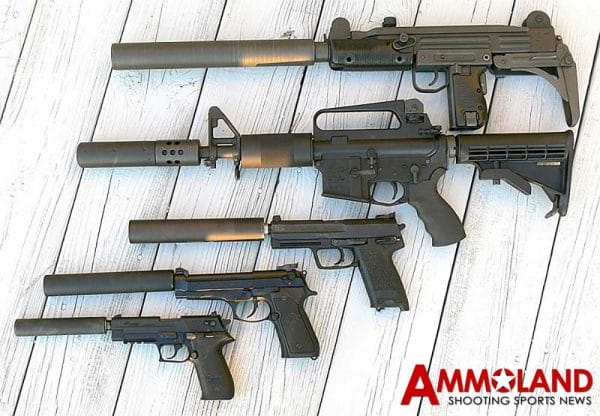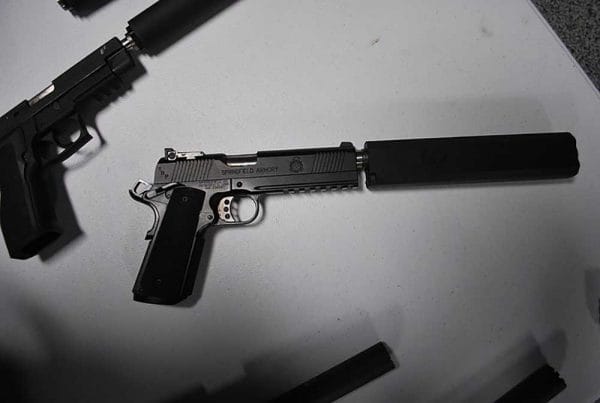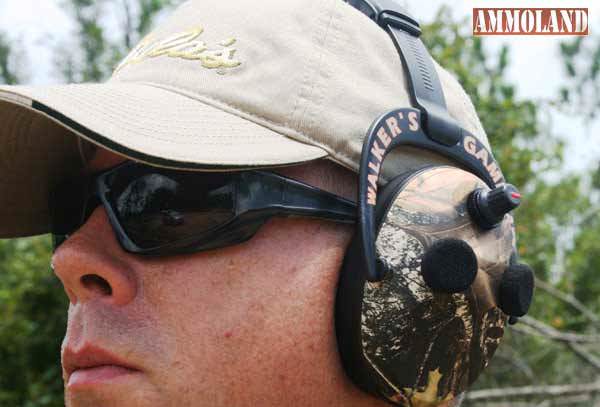Alien Gear Holsters’ editor Sam Hoober goes over just how well do suppressors work, as they have been an item of great concern in recent years.


U.S.A. –-(Ammoland.com)- One of the biggest news items in the gun world of late has been suppressors and the National Hearing Protection Act. For those not following the news, the NHPA would remove suppressors – a.k.a. “silencers” – from the list of heavily regulated devices, allowing one to purchase them without having to get the tax stamp from the ATF.
This is also the reason a number of people have a threaded barrel for their pistol, whether the threaded barrel goes in their concealed carry holster or not.
But just how well do they work?
It’s worth looking at, as one of the biggest selling points of suppressors is that they attenuate noise. The typical gunshot produces 140 to 160 decibels of noise, which instantly damages hearing. Any noise above 140 dB produces instant hearing damage, so anything that brings a gunshot below that threshold is worth looking into.
Just Don’t Call Them Silencers
It’s a myth that suppressors make anything “silent.” A gunshot is still going to sound like a gunshot; it just might be somewhat quieter. That said, how well do they work?
The truth is there’s an economy of scale. Part of it comes down to the suppressor used – is it for the caliber you’re using or is it a generic design for multiple calibers, how long/short it is and how its made – as those factors make an impact. So does ammunition; supersonic ammunition, meaning that traveling at 1,125 feet per second and faster, makes a sonic “crack” that subsonic ammunition does not. Ambient temperature, humidity, and elevation also make an impact.
Put a bit more simply, how well a suppressor works on paper differs from how well it will work for YOU depending on a number of factors, so YMMV (your mileage may vary).

That said, let’s try to come up with an average of sorts.
Looking at a few different products, SilencerCo. attests their suppressors reduce the sound pressure of a 9mm gunshot to anywhere from 125.7 dB to 131.5 dB, depending on the model. Advanced Armament Co, another popular supplier, attests a 23 dB to 33dB reduction or down to 127 dB. Liberty Suppressors, another manufacturer, attests a reduction of 24 dB to 38 dB, depending on model and other factors.
In short, we can presume something on the order of 30dB of attenuation as an average. Since the typical gunshot produces about 160 dB of noise, that means a suppressor will still lower the noise to 130 dB. It could be more or less – even much less, in some cases – but this is more of an average rather than for a specific make/model silencer for a specific caliber. You can argue amongst yourselves in the comments if you take umbrage.
Do Suppressors Work? I Use Ear Protection At All Times…

Presuming an average attenuation of 30 dB and sound level of 130 dB with a suppressor, you should still wear ear protection.
The louder the noise and the longer you’re exposed to the noise level, the more likely hearing damage becomes or the more permanent damage occurs. Hearing loss can be induced by being exposed to a constant 85 dB noise, which is why OSHA mandates 85 dB be as loud as workplaces get – even industrial ones – without mandatory ear protection.
Noises in excess of 120 dB – which is the sound pressure generated by a jumbo jet on tarmac from 100 yards away – can cause permanent hearing loss if exposure lasts just minutes; 15 minutes with a 115 dB sound system will damage your hearing. An afternoon’s shooting, even if attenuated to that low a sound pressure level, can still damage hearing permanently.
However, a pistol or rifle suppressed to 130 dB, with further attenuation from hearing protection, will be safer still.
So, to sum up, suppressors don’t “silence” a gunshot by any means. Though they can be effective and definitely reduce the overall noise level, they still generate – in most cases – sufficient noise to damage hearing. Thus, if you get one, make sure you use it with hearing protection as well.
About Sam Hoober
Sam Hoober is a contributing editor at Alien Gear Holsters, as well as for Bigfoot Gun Belts. He also writes weekly columns for Daily Caller and USA Carry.

Those against suppressors aren’t fooling anyone. They’re issue is all firearms and ANYTHING they can do to infringe upon your Right to own guns is what is in their sights.
That’s really not true at all. You shouldn’t make such wild and baseless assumptions. That kind of thing only serves to divide the public. I know plenty of people who fear that silencers are actually silent and fear what they could be used for if that were true. These people do fully support the 2nd Amendment so it’s not about removing all guns. That’s just talking from the fantasy extreme. Some people just need to have silencers explained in plain English about how much noise reduction there really is. I didn’t know the answer to that question but it is… Read more »
Some groups of people refuse to be educated on anything that has to do with firearms and the 2nd. Amendment.
Thoae people will not listen to any pro-gun points and never will. They are as stubbornly anti gun as I am pro gun. You cannot use logic to convince them as their decision making is not based on logic, it is based on emotion.
How about comparing a suppressor or silencer to other sound reduction systems? Most hearing protection has a 22 dB to 30 dB reduction capability.
The question that needs to be answered is simple.
How much of the noise is from sonic pop and how much is from muzzle blast ? The sonic pop happens after the bullet leaves the suppressor so it cannot be suppressed.
That’s a good question. I have been searching for an answer to that too. From what I am learning it seems if you use a silencer that you still need ear protection. Hopefully people will realize that a silencer does not replace ear protection.
The simplest way to esplain how a supressor works is: you ate alot of beans – now a huge gas pain – let it go . kawosh-kabom … A supressor is like holding your bum cheeks together very tightly – – squeak … squeak … not as loud but hot gass has to go somewhere . . . got it yet? if not your firearm or you just exploded . . . The laws of physics do not allow a sound to be eliminated . . just attenuated.
Articles about suppressors that don’t relate the db rating to sounds that we’re used to hearing are essentially worthless.
Either tell us what that sound level SOUNDS LIKE – or at least give us the usual db chart that compares db levels to sounds we’re familiar with.
Does a suppressor quiet a .45 to the level of a .22? Or an airgun? That sort of comparison makes more sense than citing db levels.
Ditto on Chris’ comments. I think the author simply but incorrectly used mph instead of fps.
Yup, 22LR at 1035 (advertised) FPS will still crack the sound barrier, I know I have a SC SPECTRE 2.
Speed of sound at 5,000′ is 1096fps at standard temperature & pressure, so either your ammunition is exceeding its stated velocity or you’re above 5,000′.
My suppressed .22 CZ455 firing Eley or RWS subsonics is slightly quieter than my unsuppressed 12ft/lb .22 air rifle.
My suppressed .243 AI is still loud enough that I always wear hearing protection when firing standard ammunition.
It is hard to take seriously someone who doesn’t know the speed of sound through air. For those that don’t know: https://en.wikipedia.org/wiki/Speed_of_sound
You would have better served your readers, especially new shooters, using 1100+/- Feet Per Second as your threshold for supersonic. Of course that does have to include some variables, such as air temperature and height above sea level.
I know I have never bought a box of ammo that listed “Miles Per Hour” for the velocity.
“meaning that traveling at 1,125 miles per hour and faster”
Wrong.
You mean FPS or 767 MPH
1125 mph? That’s wrong. 1125 fps is more like it.